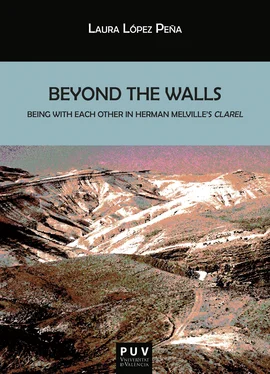Laura López Peña - Beyond the Walls.
Здесь есть возможность читать онлайн «Laura López Peña - Beyond the Walls.» — ознакомительный отрывок электронной книги совершенно бесплатно, а после прочтения отрывка купить полную версию. В некоторых случаях можно слушать аудио, скачать через торрент в формате fb2 и присутствует краткое содержание. Жанр: unrecognised, на английском языке. Описание произведения, (предисловие) а так же отзывы посетителей доступны на портале библиотеки ЛибКат.
- Название:Beyond the Walls.
- Автор:
- Жанр:
- Год:неизвестен
- ISBN:нет данных
- Рейтинг книги:3 / 5. Голосов: 1
-
Избранное:Добавить в избранное
- Отзывы:
-
Ваша оценка:
- 60
- 1
- 2
- 3
- 4
- 5
Beyond the Walls.: краткое содержание, описание и аннотация
Предлагаем к чтению аннотацию, описание, краткое содержание или предисловие (зависит от того, что написал сам автор книги «Beyond the Walls.»). Если вы не нашли необходимую информацию о книге — напишите в комментариях, мы постараемся отыскать её.
Beyond the Walls. — читать онлайн ознакомительный отрывок
Ниже представлен текст книги, разбитый по страницам. Система сохранения места последней прочитанной страницы, позволяет с удобством читать онлайн бесплатно книгу «Beyond the Walls.», без необходимости каждый раз заново искать на чём Вы остановились. Поставьте закладку, и сможете в любой момент перейти на страницу, на которой закончили чтение.
Интервал:
Закладка:
1 In Humanism of the Other , Levinas does not capitalize the word “other”.
2 On the other hand, Judith Butler, among other theorists, has also criticized Levinas’s arguments on morality as problematic due to the fact that they are inscribed within the Judeo-Christian tradition, which might even make the ethical relationship articulated in Levinas’s philosophical thinking parochial and excluding of those outside such religious and cultural sets of beliefs (Butler “Precarious” 12).
Chapter 2
Intersubjectivity and Universalism
in Herman Melville’s Oeuvre
A MANYSIDED “ELASTICITY OF MIND”
According to Hilton Obenzinger, Melville’s works display “elasticity of mind”, a characteristic the scholar defines as “the ability to cross over and entertain forbidden arguments, identities, and states of being; the persistence to ask ultimate questions; the compassion to reach out to fellow slaves, savages, renegades, isolatoes, common sailors, ‘Cross-bearers all’ who feel ‘the universal thump’” (“Wicked” 195). Melville’s texts constitute microcosms for the writer’s analyses of the potentiality of intersubjectivity to the creation, or absolute destruction, of more democratic human relationships and thinking parameters, in the midst of contexts of egocentric self-isolation, communitarian segregation, and inter-human divisions of diverse kinds (ethnic, cultural, religious, national, social, sexual). Melville did not vindicate an abstract kind of universalism in his texts, and he also parodied and denounced with great severity cosmopolitan appropriations and manipulations of Kant’s vision of the unity of mankind, 1 most remarkably in his last novel The Confidence Man (1857). Above all, Melville was well-aware of the dangers of imposing Kantianism as a vision of the world that neutralized, invalidated, and absorbed all others. 2 Instead, as Timothy Marr has noted in the following remarks on Moby-Dick : “By accentuating the worldly diversity of his crew, Melville ‘federated’ a broad latitude of literary characters that empowered his challenge to the ethnocentric claims of universality held by the supposedly civilized” (“Without” 136). It is in line with Marr’s argument that the present study conceives Melville’s universalist project in Clarel , the author’s most highly populated text according to Newton Arvin (276). Such universalism, Melville exposed, is as plural and imperfect as human beings—and, consequently, interpretations of reality—have existed, exist, or will exist on the earth.
Melville’s deep appreciation of plurality and respect for the ungraspable depths of the human soul is shown in his texts’ dignifying portrayals of characters representing those whom nineteenth-century average readers and society marginalized or simply dismissed as either mad or odd. Melville’s works connect multiple forms of existence and human emotions; they emphasize both the common characteristics of life “Or man or animal, […] / Cross-bearers all” (4.34.42-43) and the specificity of such existence and emotions to each individual, being always respectful of plurality and of the uniqueness of each person’s struggle and suffering. Melville’s texts bring together different perspectives in democratic conversations. At the same time, the author acknowledges and works with the difficulties and paradoxes posed by the efforts to trigger democratic dialogue and the willingness to give expression to such plurality of personalities, moods, and viewpoints. Insisting on the danger of universalizing a particular opinion or interpretation as Meaning, Melville’s works are critical of one-sided ways of thinking which admit no other views because of ignorance (“to the people of the Archipelago the map of Mardi was the map of the world. […] they had no certain knowledge of any isles but their own” [ Mardi 838]), or because they constitute monomaniac assumptions. The Confidence-Man , for example, develops an intricate critique of one-sided thinking centered precisely on the character of the cosmopolitan itself. Ironically naming his cosmopolitan Frank Goodman, Melville sarcastically portrays the paradox between the cosmopolitan’s guiding principle “I will not prescribe my nature as the law to other natures” (1029), and his efforts to convert to his “philanthropic” philosophy those fellow travelers he conceives as misled in their beliefs (“Now let me set you on the right track; let me restore you to trust in human nature” [1091-1092]). Most importantly, in his preachings for fraternal love and universal communion, the cosmopolitan is actually a trickster who exploits the love of humanity he vindicates, in order to manipulate and swindle the confidence of his fellow mortals. Actually, Frank Goodman’s speeches take such inflated tone and wordings that they immediate provoke the readers’ critical distance from the very philanthropy they profess:
Is the sight of humanity so very disagreeable to you then? Ah, I may be foolish but for my part, in all its aspects, I love it. Served up à la Pole, or à la Moor, à la Ladrone, or à la Yankee, that good dish, man, still delights me; or rather is man a wine I never weary of comparing and sipping; wherefore I am a pledged cosmopolitan […], a taster of races; in all his vintages, smacking my lips over this racy creature, man, continually. ( Confidence-Man 982)
Melville’s description of cannibalistic philanthropy in the previous passage is fitting to the whole novel, as Goodman “devours” like a predator the confidence his fellow travelers deposit on him. Through Goodman, Melville analyzes how the confidence-man blends within the cosmopolitan type. As John Bryant has argued, Melville studied that the cosmopolitan’s rootless, traveling, and apparently charitable nature could be the potential for trickery and cheat (“Nowhere” 289).
Laying bare this discourse of philanthropy and denouncing the exploitation of philanthropy for negative ends, the novel’s critique of cosmopolitanism is similar to Judith Butler’s claim that presenting Kantian cosmopolitanism as the only possible way to articulate universality is already a cultural imposition (“Universality” 52). This cultural imposition defeats the very purpose of plurality upon which cosmopolitanism is apparently rooted, because it implies clinging to a parochial conception of the universal and imposing such parochial conception as the only valid way to think universality. Butler’s claim is that the meaning of universality cannot be anticipated prior to its creation because universalism may only start being created through a questioning of its already existing formulation (48): “A universality that is yet to be articulated […] one for which we have no ready concept, one whose articulations will only follow, if they do, from a contestation of universality at its already imagined borders” (49). Comparable to Butler’s line of thought is the critique of one-sided universalisms in Melville’s literary production, and its articulation of a conception of universalism based on the diversity and the common humanity of human beings in their vulnerability and suffering condition, which exposes the inseparability of the local and the global, the particular and the universal. The superb yet tragic vision, described by the narrator in Israel Potter , of human beings as bricks that are part of, and molded in order to fit within, an aggregate, may be said to expose Melville’s concern that the individual be not absorbed within a particular identity or community: “Are not men built into communities just like bricks into a wall?” ( Israel Potter 601). This looks like a frightening image where the individuality of each brick is lost to the immensity of the wall, their “ragged edges” ( Billy Budd 517) polished in order to fit within the homogeneous and homogenizing whole. Moreover, it also seems to anticipate the author’s affirmation in his 1858 lecture “Traveling” that communities “shut” human beings away “from the outer world” (421). The narrator underlines the singular character of each brick in the passage, which he enumerates, in the same way that he has created a narrative dedicated to one of these anonymous “brick-men”, and, in doing so, rescued the individuality of the neglected and forgotten Israel by the act of telling his story. Images of walls permeate not only Israel Potter but Melville’s literary production in general, especially Clarel . It is indeed significant that characters such as Bartleby, in the story with the same title, and Celio, in Clarel , should die with their eyes fixed on stony walls. These walls evoke the interpersonal obstacles these characters encountered in life, and which led them to their tragic endings alone and rejected. It seems also important that Pierre would “dash[…] himself in blind fury and swift madness against the wall, and fell dabbling in the vomit of his loathed identity” ( Pierre 203), as he struggled against his inherited aristocratic social role. In these different texts, walls constitute separating barriers: the image of the bricks in Israel Potter comes to mind when readers contemplate Pierre’s abandonment of the social class and role-model into which, as a brick within a wall, he had been polished to fit since childhood; and, on the other hand, both Celio and Bartleby resist being molded into a particular community-wall. The multiple walls these characters find—or, in the case of Pierre Glendinning, erect—as they try to develop any intersubjective connection with fellow human beings, condemn them to their castaway status and, eventually, to their forlorn death, rejected and abandoned by human society.
Читать дальшеИнтервал:
Закладка:
Похожие книги на «Beyond the Walls.»
Представляем Вашему вниманию похожие книги на «Beyond the Walls.» списком для выбора. Мы отобрали схожую по названию и смыслу литературу в надежде предоставить читателям больше вариантов отыскать новые, интересные, ещё непрочитанные произведения.
Обсуждение, отзывы о книге «Beyond the Walls.» и просто собственные мнения читателей. Оставьте ваши комментарии, напишите, что Вы думаете о произведении, его смысле или главных героях. Укажите что конкретно понравилось, а что нет, и почему Вы так считаете.










